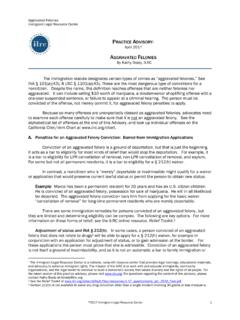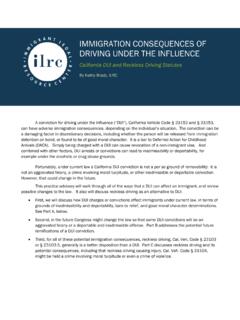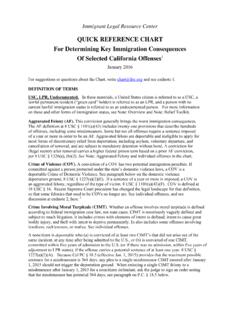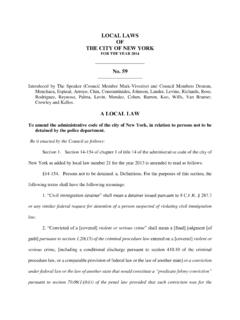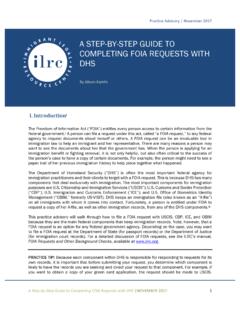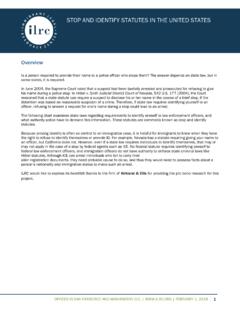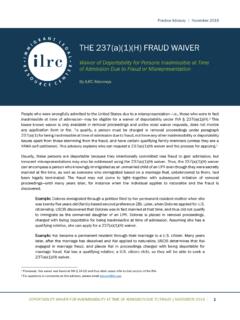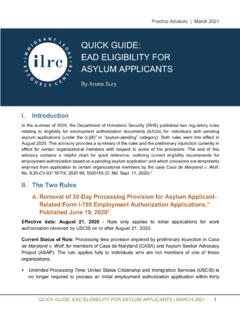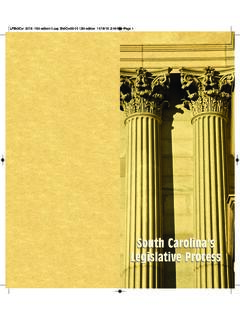Transcription of § N.6 Aggravated Felonies - ILRC
1 Immigrant Legal Resource Center, Aggravated Felonies January 2013 Aggravated Felonies (For more information, see Defending Immigrants in the Ninth Circuit, Chapter 9, and see Tooby, Aggravated Felonies , ) Aggravated Felonies are defined at 8 USC 1101(a)(43), which is a list of dozens of common-law terms and references to federal statutes. They are the most damaging type of conviction for a noncitizen. A. Penalties for an Aggravated Felony Conviction: Barred from Immigration Applications Conviction of an Aggravated felony brings the most severe punishments possible under immigration laws. The conviction causes deportability and moreover bars eligibility for almost any kind of relief or waiver that would stop the deportation.
2 In contrast, a noncitizen who is merely deportable or inadmissible might qualify for a waiver or application that would preserve current lawful status or permit the person to obtain new status. Example: Marco has been a permanent resident for 20 years and has six citizen children. He is convicted of an Aggravated felony, possession for sale of marijuana. He will in all likelihood be deported. The Aggravated felony conviction bars him from applying for the basic waiver cancellation of removal for long-time permanent residents who are merely deportable. There are some immigration remedies for persons convicted of an Aggravated felony, but they are limited and determining eligibility is highly complex. See discussion in Chapter 9, , and see discussion of each form of relief and criminal record bars in Chapter 11, Defending Immigrants in the Ninth Circuit.
3 The following are some important options. Persons convicted of an Aggravated felony can apply for withholding of removal under 8 USC 1231(b)(3) if they have the equivalent of a very strong asylum claim, or for relief under the Convention Against Torture if they fear torture. Asylees and refugees convicted of an Aggravated felony still can apply for adjustment of status with a waiver; the waiver will be denied if the government has reason to believe the asylee or refugee trafficked in drugs, or if the conviction was of a dangerous or violent offense . See Relief. Persons who were not permanent residents at the time of conviction, and whose Aggravated felony does not involve controlled substances, might be able to adjust status (become a permanent resident) through a close citizen or permanent resident family member with a waiver under 8 USC 1182(h).
4 107 Immigrant Legal Resource Center, Aggravated Felonies January 2013 An Aggravated felony conviction is not a bar to applying for the T or U visas for persons who are victims of alien smuggling or a serious crime and who cooperate with authorities in prosecuting the crime. See 8 USC 1101(a)(15)(T) and (U). Permanent residents who before April 24, 1996 pled guilty to an Aggravated felony that didn t involve firearms may be able to obtain a waiver under the former 212(c) relief, but may be unable to waive any ground of deportability that has arisen since that time. See Defending Immigrants in the Ninth Circuit, B. Penalties for an Aggravated Felony Conviction: Federal offense of Illegal Re-entry A noncitizen who is convicted of an Aggravated felony, deported or removed, and then returns to the without permission faces a tough federal prison sentence under 8 USC 1326(b)(2).
5 This applies even to persons whose Aggravated Felonies were relatively minor offenses, such as possession for sale of marijuana. Criminal defense counsel must warn their clients of the severe penalty for re-entry. Example: After his removal to Mexico, Marco illegally re-enters the to join his family and maintain his business. One night he is picked up for drunk driving and immigration authorities identify him in a routine check for persons with Hispanic last names in county jails. Marco is transferred to federal custody and eventually pleads to illegal re-entry and receives a three-year federal prison sentence. He then is deported again. This penalty also applies to various offenses that are not Aggravated Felonies . See important discussion see Overview, Part 4 The Immigration Strike, supra, as well as extensive discussion at Defending Immigrants in the Ninth Circuit, Chapter 9, C.
6 The Definition of Aggravated Felony Aggravated Felonies are defined at 8 USC 1101(a)(43), which is a list of dozens of common-law terms and references to federal statutes. Both federal and state offenses can be Aggravated Felonies . A foreign conviction may constitute an Aggravated felony unless the conviction and resulting imprisonment ended more than 15 years in the past. Every offense should be suspiciously examined until it is determined that it is not an Aggravated felony. While some offenses only become Aggravated Felonies by virtue of a sentence imposed of a year or more (see Sentencing), others are regardless of sentence. Outside of some drug offenses, even misdemeanor offenses can be held to be Aggravated Felonies . Where a federal criminal statute is cited in the Aggravated felony definition, a state offense is an Aggravated felony only if all of the elements of the state offense are included in the federal offense .
7 It is not necessary for the state offense to contain the federal jurisdictional element of the federal statute (crossing state lines, affecting inter-state commerce) to be a sufficient match. Where the Aggravated felony is identified by a general or common law terms such as theft, burglary, sexual abuse of a minor courts will create a standard generic 108 Immigrant Legal Resource Center, Aggravated Felonies January 2013 definition setting out the elements of the offense . To be an Aggravated felony, a state offense must be entirely covered by the generic definition. See, , discussion in Burglary, or Chapter 9 of Defending Immigrants in the Ninth Circuit. The following is a list of the offenses referenced in 8 USC 1101(a)(43) arranged in alphabetical order .
8 The capital letter following the offense refers to the subsection of 1101(a)(43) where the offense appears. Aggravated Felonies under 8 USC 1101(a)(43) (displayed alphabetically; statute subsection noted after category) alien smuggling- smuggling, harboring, or transporting of aliens except for a first offense in which the person smuggled was the parent, spouse or child. (N) attempt to commit an Aggravated felony (U) bribery of a witness- if the term of imprisonment is at least one year. (S) burglary- if the term of imprisonment is at least one year. (G) child pornography- (I) commercial bribery- if the term of imprisonment is at least one year. (R) conspiracy to commit an Aggravated felony (U) counterfeiting- if the term of imprisonment is at least one year.
9 (R) crime of violence as defined under 18 USC 16 resulting in a term of at least one year imprisonment, if it was not a purely political offense . (F) destructive devices- trafficking in destructive devices such as bombs or grenades. (C) drug offenses- any offense generally considered to be drug trafficking, plus cited federal drug offenses and analogous felony state offenses. (B) failure to appear- to serve a sentence if the underlying offense is punishable by a term of 5 years, or to face charges if the underlying sentence is punishable by 2 years. (Q and T) false documents- using or creating false documents, if the term of imprisonment is at least twelve months, except for the first offense which was committed for the purpose of aiding the person s spouse, child or parent.
10 (P) firearms- trafficking in firearms, plus several federal crimes relating to firearms and state analogues. (C) forgery- if the term of imprisonment is at least one year. (R) fraud or deceit offense if the loss to the victim exceeds $10,000. (M) illegal re-entry after deportation or removal for conviction of an Aggravated felony (O) 109 Immigrant Legal Resource Center, Aggravated Felonies January 2013 money laundering- money laundering and monetary transactions from illegally derived funds if the amount of funds exceeds $10,000, and offenses such as fraud and tax evasion if the amount exceeds $10,000. (D) murder- (A) national defense- offenses relating to the national defense, such as gathering or transmitting national defense information or disclosure of classified information.
